UN General Assembly
Czech president Petr Pavel: Ukraine war fatigue weakening NATO unity against Russia

- YouTube

In a GZERO Global Stage discussion at the 79th UN General Assembly, Czechia President Peter Pavel highlighted the evolving dynamics within NATO nearly two years after Russia's invasion of Ukraine. He acknowledged that initial unity, which surged in response to the shock of the invasion, has waned as war fatigue sets in.
"I had an impression that some representatives of the countries are a little bit tired by always hearing that we need to support Ukraine, and we need to condemn Russian aggression," he said.
President Pavel emphasized that the conflict transcends regional borders, threatening global principles by challenging the UN Security Council's core values. He stressed the need for continued opposition to Russia's aggression, warning that a victory for Russia could embolden similar regimes to pursue military solutions to achieve their aims.
Pavel spoke during GZERO’s Global Stage livestream, “Live from the United Nations: Securing our Digital Future,” an event produced in partnership between the Complex Risk Analytics Fund, or CRAF’d, and GZERO Media’s Global Stage series, sponsored by Microsoft. The Global Stage series convenes heads of state, business leaders, and technology experts from around the world for a critical debate about the geopolitical and technological trends shaping our world. Click here to watch the full conversation.
People in support of former South Korean President Yoon Suk Yeol rally near Seoul Central District Court in Seoul on Feb. 19, 2026. The court sentenced him to life imprisonment the same day for leading an insurrection with his short-lived declaration of martial law in December 2024.
65: The age of former South Korean President Yoon Suk Yeol, who was sentenced to life in prison on Thursday after being found guilty of plotting an insurrection when he declared martial law in 2024.
In an era when geopolitics can feel overwhelming and remote, sometimes the best messengers are made of felt and foam.
The Hungarian election is off to the races, and nationalist Prime Minister Viktor Orbán is facing his most serious challenger in 16 years.
Does skepticism rule the day in politics? Public opinion data collected as part of the Munich Security Conference’s annual report found that large shares of respondents in G7 and several BRICS countries believed their governments’ policies would leave future generations worse off.